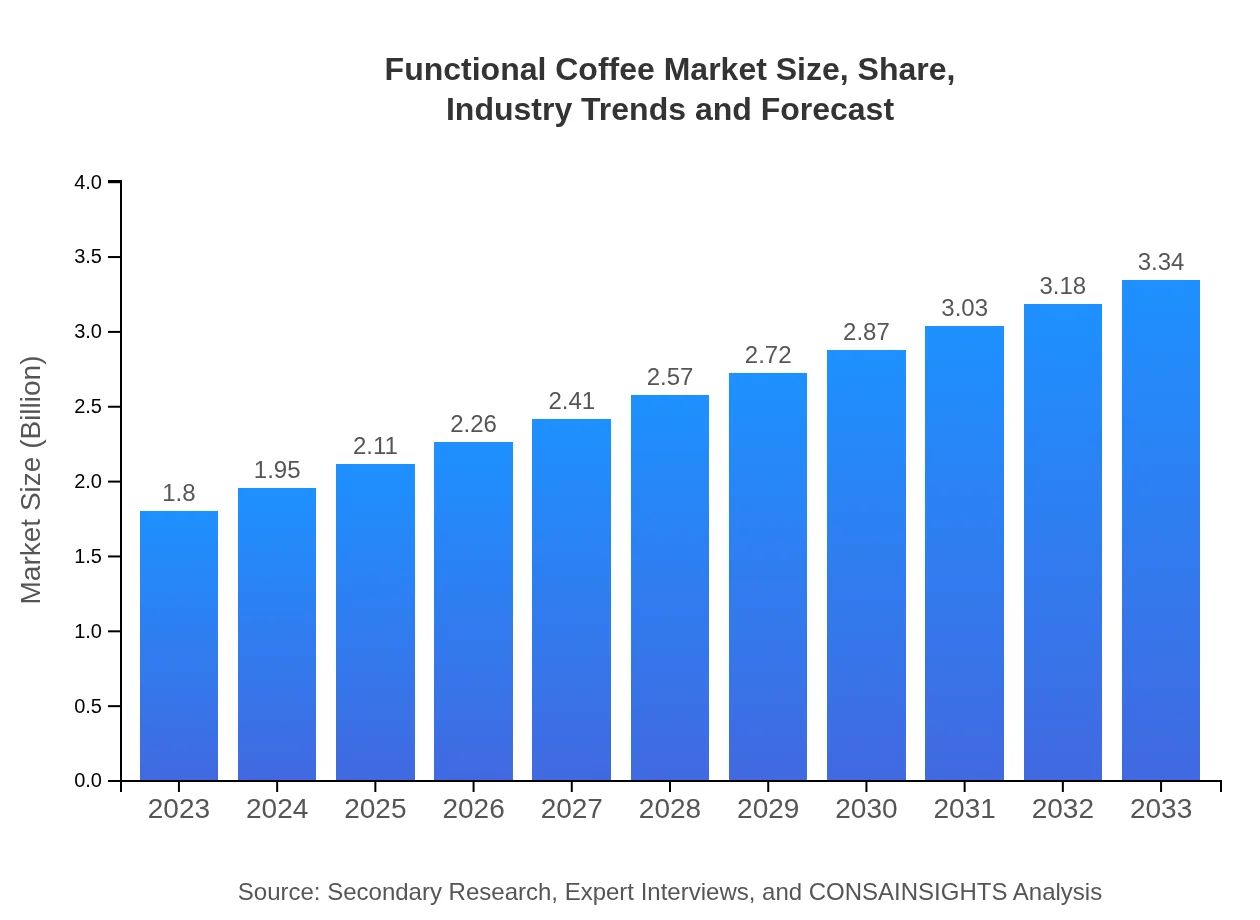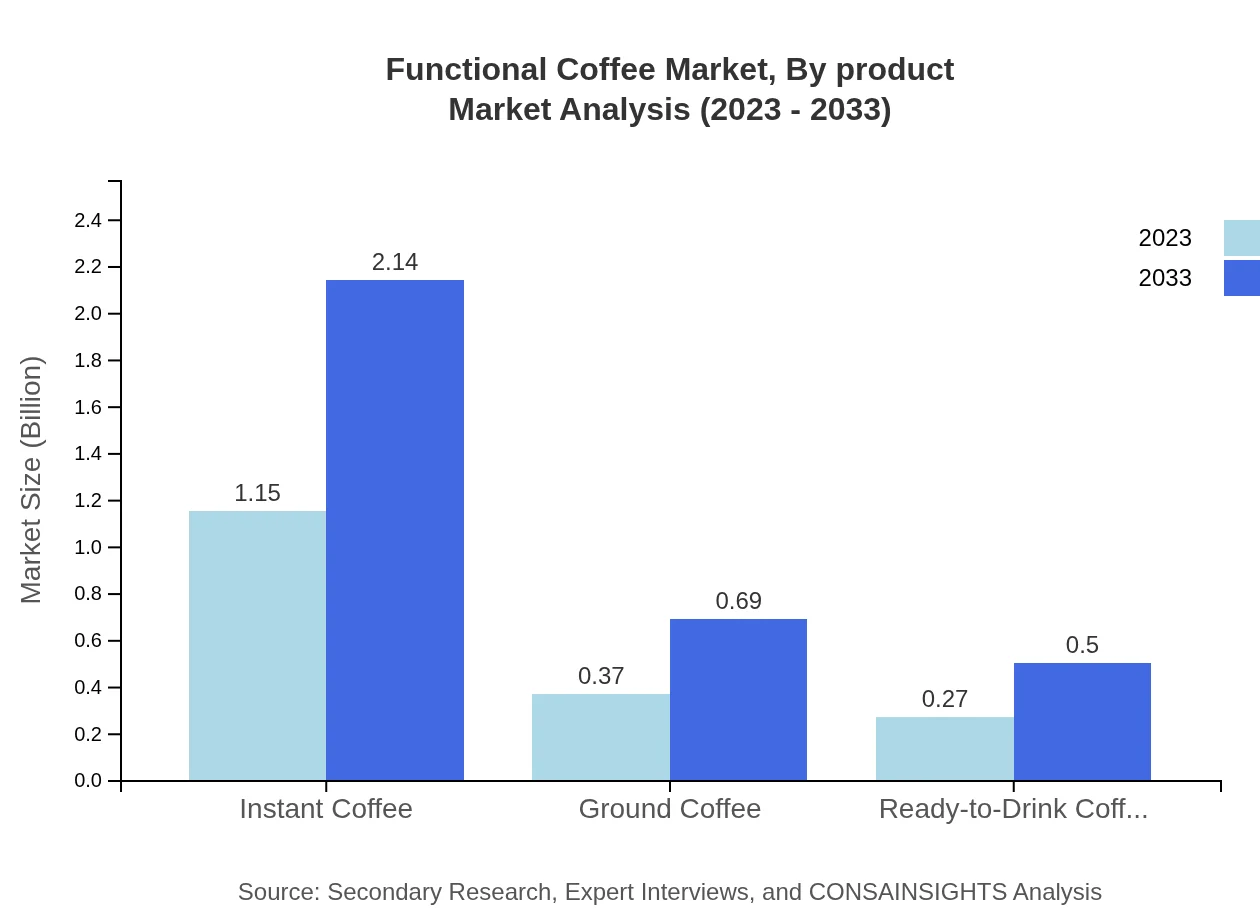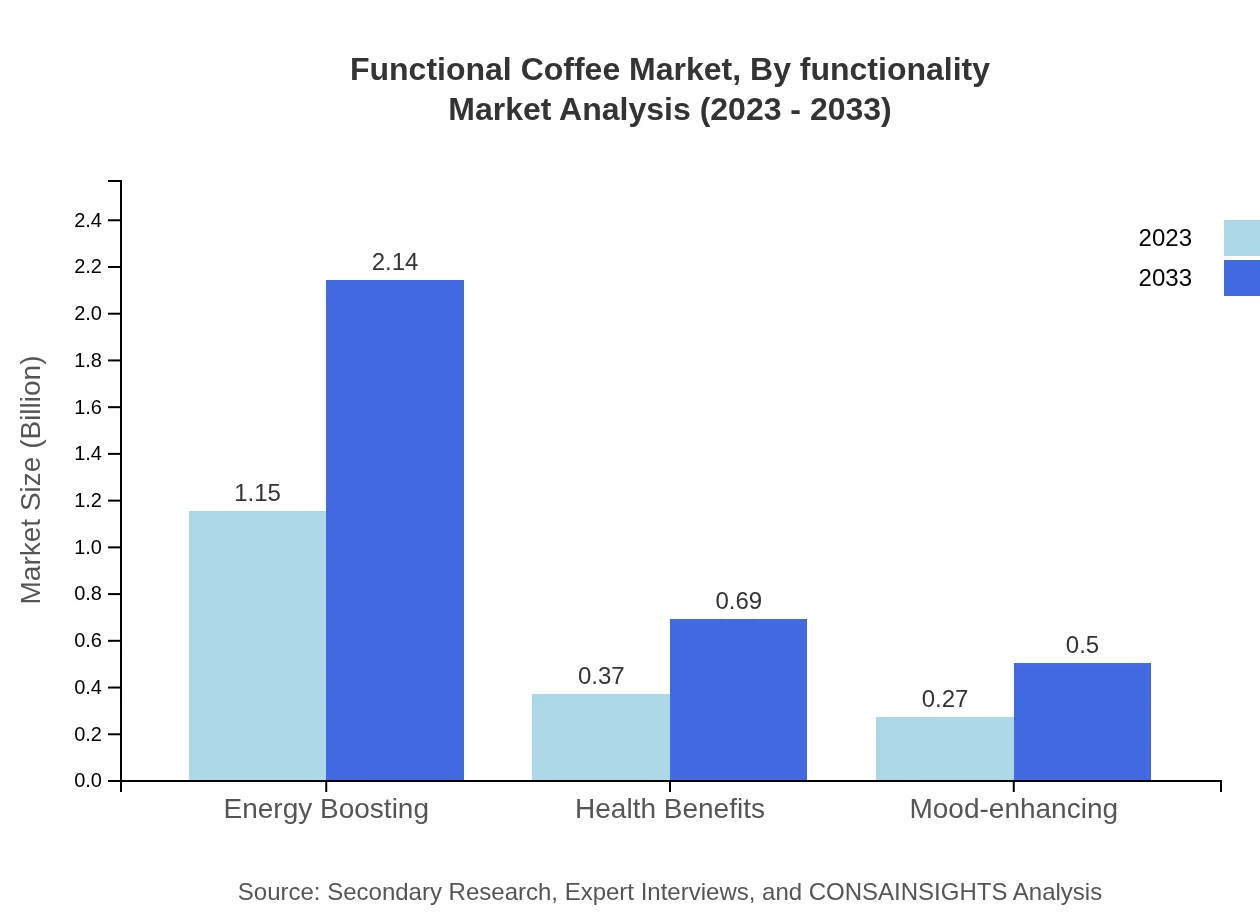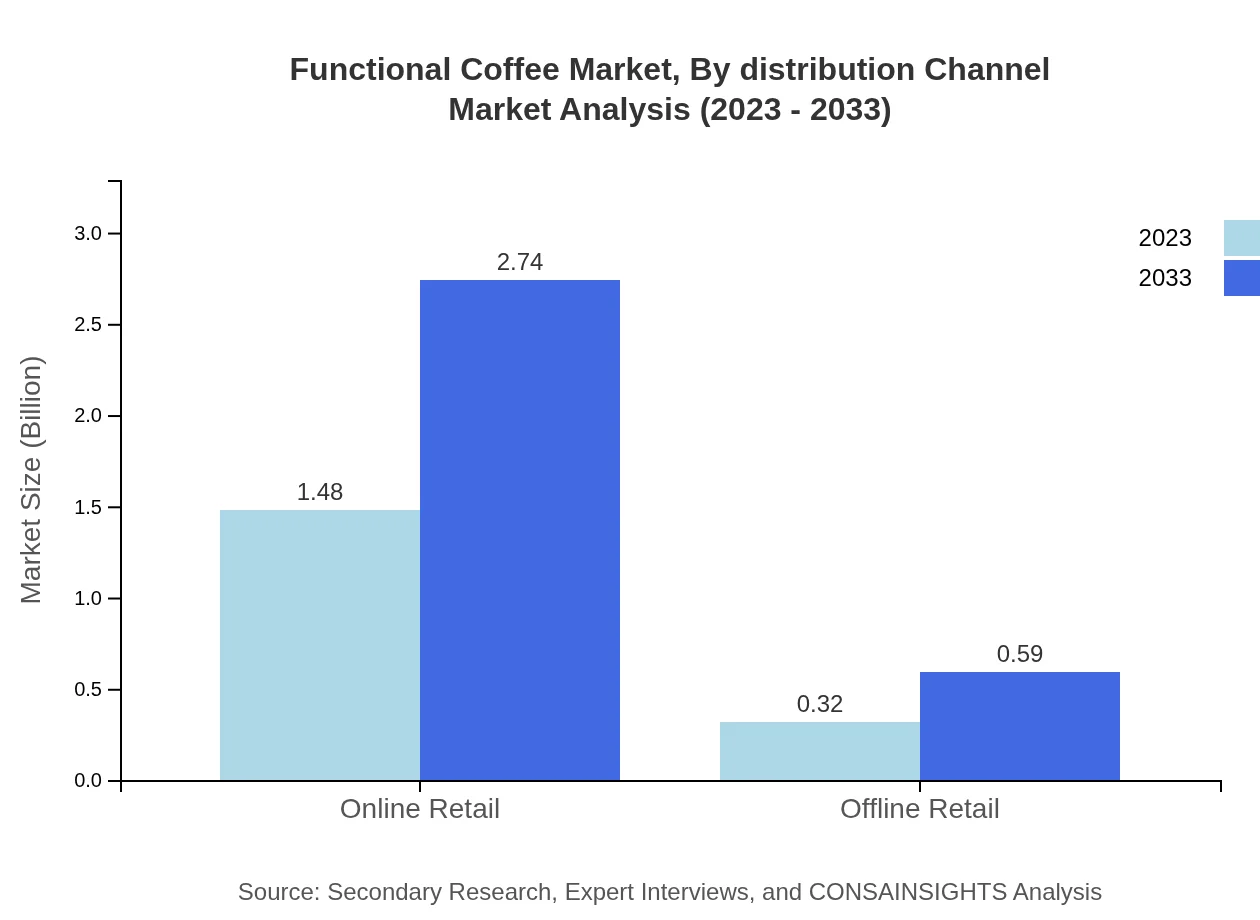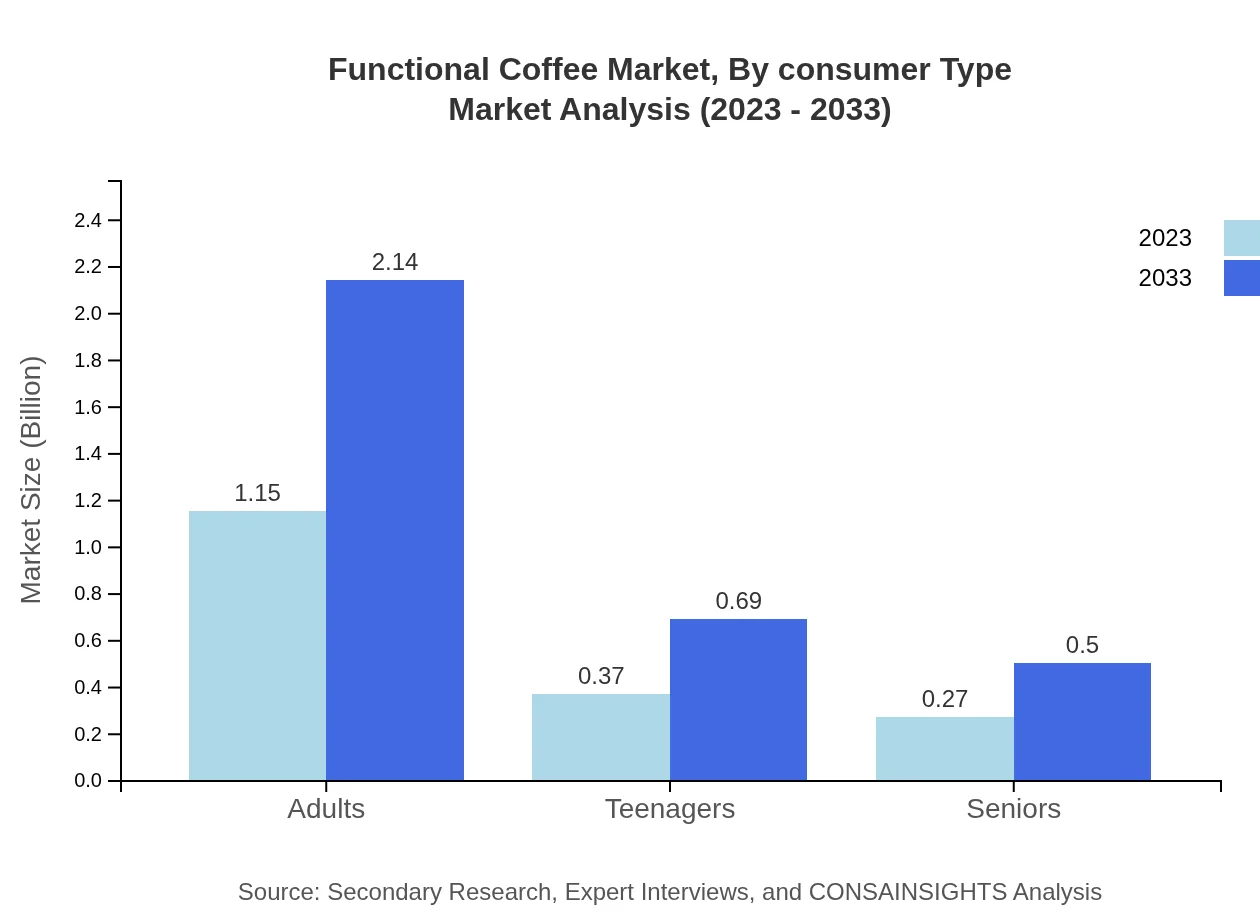Functional Coffee Market Report
Published Date: 31 January 2026 | Report Code: functional-coffee
Functional Coffee Market Size, Share, Industry Trends and Forecast to 2033
This report provides a detailed analysis of the Functional Coffee market from 2023 to 2033, including market size, segmentation, regional insights, trends, and forecasts to help stakeholders make informed decisions.
| Metric | Value |
|---|---|
| Study Period | 2023 - 2033 |
| 2023 Market Size | $1.80 Billion |
| CAGR (2023-2033) | 6.2% |
| 2033 Market Size | $3.34 Billion |
| Top Companies | Nestlé S.A., Starbucks Corporation, Peet's Coffee, Dunkin' Brands Group, Inc. |
| Last Modified Date | 31 January 2026 |
Functional Coffee Market Overview
Customize Functional Coffee Market Report market research report
- ✔ Get in-depth analysis of Functional Coffee market size, growth, and forecasts.
- ✔ Understand Functional Coffee's regional dynamics and industry-specific trends.
- ✔ Identify potential applications, end-user demand, and growth segments in Functional Coffee
What is the Market Size & CAGR of Functional Coffee market in 2023?
Functional Coffee Industry Analysis
Functional Coffee Market Segmentation and Scope
Tell us your focus area and get a customized research report.
Functional Coffee Market Analysis Report by Region
Europe Functional Coffee Market Report:
The European market, valued at $0.49 billion in 2023, is anticipated to increase to $0.91 billion by 2033. Consumer trends indicate a shift towards organic and health-enhanced beverages, aligning perfectly with the Functional Coffee category.Asia Pacific Functional Coffee Market Report:
In the Asia Pacific region, the Functional Coffee market is valued at approximately $0.35 billion in 2023, projected to grow to $0.65 billion by 2033. This growth is fueled by increasing consumer interest in health and wellness, coupled with rising disposable incomes, leading to higher coffee consumption rates.North America Functional Coffee Market Report:
North America holds a substantial market value, with a size of $0.62 billion in 2023, expected to climb to $1.14 billion by 2033. The popularity of specialty coffee and a trend towards preventive health measures among consumers serves as primary growth factors.South America Functional Coffee Market Report:
The South American market has an estimated value of $0.09 billion in 2023, expected to rise to $0.17 billion by 2033. The cultural significance of coffee and the growing demand for health-oriented products are critical growth drivers in this region.Middle East & Africa Functional Coffee Market Report:
The Middle East and Africa region shows a market value of $0.24 billion in 2023, expected to grow to $0.45 billion by 2033. Growing urbanization, coupled with a rising young population interested in functional beverages, propels market growth in this region.Tell us your focus area and get a customized research report.
Functional Coffee Market Analysis By Product
The Functional Coffee market segment shows an estimated value of $1.15 billion in instant coffee products for 2023, with projections of $2.14 billion by 2033. Instant coffee dominates due to consumer preference for quick preparation. Ground coffee also demonstrates potential growth, particularly in health-focused variations, valued at $0.37 billion in 2023 and expected to reach $0.69 billion by 2033.
Functional Coffee Market Analysis By Functionality
Energy-boosting coffees represent a significant size of $1.15 billion in 2023, reflecting the growing consumer need for alertness enhancement. Health-benefit coffee options also stand out with a market value of $0.37 billion in 2023. The increasing focus on holistic wellness is leading consumers to opt for coffee products that offer additional health advantages.
Functional Coffee Market Analysis By Distribution Channel
Online retail dominates the market with a staggering value of $1.48 billion in 2023, versus offline retail at $0.32 billion. Factors contributing to online retail's success include convenience and broader product selections, while offline channels remain critical for brand visibility and sampling opportunities.
Functional Coffee Market Analysis By Consumer Type
The adults segment leads the market with a size of $1.15 billion in 2023, primarily due to the high demand for functional products among professionals. The teenagers' segment also shows potential, with a market of $0.37 billion, reflecting shifts in tastes towards functional beverages from younger consumers.
Functional Coffee Market Trends and Future Forecast
Tell us your focus area and get a customized research report.
Global Market Leaders and Top Companies in Functional Coffee Industry
Nestlé S.A.:
This global food and beverage leader provides a wide range of coffee products under the Nescafé brand, including functional coffee options targeting health-conscious consumers.Starbucks Corporation:
Starbucks is known for its specialty coffee, offering a variety of functional coffee drinks that appeal to health-conscious customers with unique formulations.Peet's Coffee:
Peet's offers gourmet coffee products that highlight organic and functional ingredients, catering to an upscale customer base seeking health benefits.Dunkin' Brands Group, Inc.:
Dunkin' provides robust coffee selections with functional variants, focusing on convenience and appealing to a large customer base.We're grateful to work with incredible clients.









FAQs
What is the market size of functional Coffee?
The functional coffee market is projected to reach $1.8 billion by 2033, with a compound annual growth rate (CAGR) of 6.2%. This growth reflects increasing consumer interest in health-oriented coffee options.
What are the key market players or companies in the functional Coffee industry?
Key players in the functional coffee industry include established coffee brands and health-focused startups that innovate with functional ingredients, enhancing both flavor and health benefits to meet market demand.
What are the primary factors driving the growth in the functional Coffee industry?
Growth in the functional coffee industry is primarily driven by rising health consciousness among consumers, increasing demand for convenient beverage options, and the trend towards functional foods that offer health benefits.
Which region is the fastest Growing in the functional Coffee?
The fastest-growing region for functional coffee is North America, expected to grow from $0.62 billion in 2023 to $1.14 billion by 2033. This region is followed by Europe and Asia Pacific, reflecting strong market dynamics.
Does ConsaInsights provide customized market report data for the functional Coffee industry?
Yes, ConsaInsights provides customized market report data tailored to the functional coffee industry, allowing stakeholders to obtain specific insights relevant to their strategic planning and decision-making.
What deliverables can I expect from this functional Coffee market research project?
Expect comprehensive analysis reports, market forecasts, trend evaluations, competitor benchmarking, and tailored recommendations that align with the objectives of your functional coffee business.
What are the market trends of functional Coffee?
Current trends in the functional coffee market include a growing preference for organic and sustainable products, increasing integration of functional ingredients, and a shift towards online retailing as a major sales channel.

